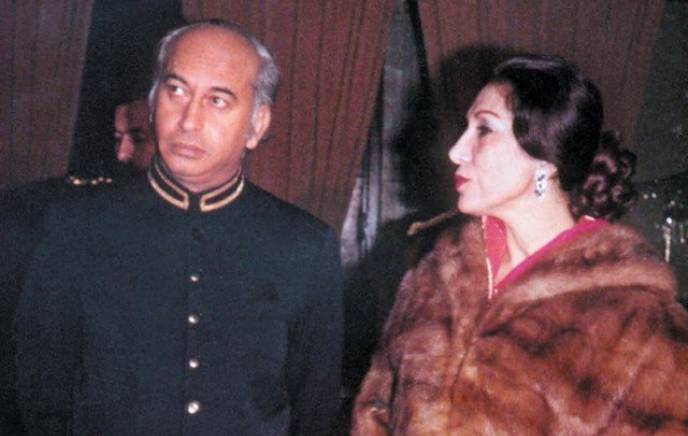Begum Nusrat Bhutto: Remembering Our Mother of Democracy

Stay tuned with 24 News HD Android App

In 2011, Begum Nusrat Bhutto was acknowledged for her invaluable contributions for Pakistan’s democracy and was given the highest civilian award posthumously, the Nishan-e-Pakistan along with the title of Mother of Democracy. It is a fitting tribute for a brave political leader and a compassionate person.
Often, the gap left by our beloved leaders is never fulfilled and the yearning for their guiding light is felt forever. Their memories, however, keep them alive in our hearts and minds. Begum Nusrat Bhutto is one such leader whose supporters still bathe in the fragrance of her memory.
Her charismatic personality and efforts for democracy will never be forgotten by the PPP workers and for this reason, her birthday is celebrated every year with great enthusiasm. 23rd of March is her birthday and on Pakistan Day, we get to pay tribute to Pakistan’s Mother of Democracy.
Forty-five years ago, there was the International Women’s Conference held in Mexico and Begum Nusrat Bhutto led Pakistan’s delegation. She represented the Pakistani women on the World’s stage. In recognition of her contributions, she was appointed the Vice Chairperson of the International Conference which was a great honour for Pakistan.
She shared with me a memorable interaction from the Conference held in 1975. A member of the Indian delegation asked one of the members of our delegation, “Who are you?” She replied, “I am a Pakistani.” The Indian member asked for further explanation and wanted to know which part of Pakistan does she belong? The Pakistani woman replied, “from Pakistan”.
Instead of declaring her association with a specific province or caste, the woman insisted she belonged to Pakistan only. Begum Nusrat Bhutto was very proud of that girl. She said our younger generation should follow this line of thinking and be proud of being a Pakistani.
Regarding women’s role in politics, Begum Nusrat Bhutto had a clear point of view that under the fag of PPP, women fought against dictatorship for the first time. They withstood difficulties such as being baton-charged or arrested, but they tolerated these difficulties with great valour.
In line with the party’s mission, Begum Nusrat Bhutto wanted to give the other half of the Pakistani population a more significant role in politics and decision making where their rights are concerned. She would identify as a social worker and would accept her role primarily as a social worker besides Shaheed Zulfiqar Ali Bhutto.
Begum Nusrat Bhutto’s struggle started during the tenure of General Ayub Khan and continued throughout General Zia’s tyrannical rule. When General Ayub arrested Shaheed Z A Bhutto, Begum Nusrat Bhutto came forward to lead the political front and campaigned for his release.
After the 1970 elections, when PPP formed a government, Begum Nusrat Bhutto became the first lady and made remarkable contributions for the betterment of the people. She strengthened the women’s wing of the PPP and helped in creating a sense of sociopolitical consciousness among women.
During Zia’s rule, Begum Nusrat Bhutto played an unforgettable role and did not let the party workers feel alone or left out. She stood by them, side by side, during all hardships. During the difficult period of autocracy, she was diagnosed with a grave illness.
General Zia created hurdles in Begum Nusrat Bhutto’s access to treatment. Despite her diagnosis, she was not allowed to go abroad for further evaluation and disease management. Eventually, Zia bowed to pressure from the international community and on November 22, 1982, Begum Nusrat Bhutto arrived in Munich, Germany.
Before leaving, in her message for the public, she reiterated that no one could drive them away from the path of truth and honesty. The power of the people rests with us and nothing is greater than the people’s power.
Today, as a nation, we should not forget that the sacrifices our leaders have made for democracy should not go in vain. Begum Nusrat Bhutto has set a great example of bravery and sacrifice for duty, a great lesson for the future generations of women.
